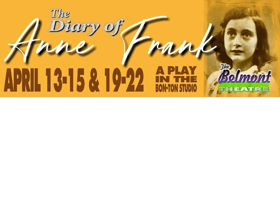Review: A Harrowing ANNE FRANK at the Belmont

The most likely thing you'll experience upon entering the Belmont Theatre's Bon Ton Studio Theatre to see THE DIARY OF ANNE FRANK is an overwhelming sense of claustrophobia. That's an aim of director Jaci Keagy. She's taken Wendy Kesselman's adaptation of Frances Goodrich's and Albert Hackett's classic play version of the Holocaust victim's diary and staged it to fit into a small, thrust-stage space, possibly the smallest stage this writer has seen used for the show, with audience seats in the first row nearly in the paths of the actors. Using so small a space to lay out the few rooms of the secret addition to Otto Frank's business, and placing the audience into that space, forces one to realize just how overwhelming the difficulty of eight people living in such cramped quarters for more than two years really must have been.
The idea of this staging is thought provoking, and certainly makes the outbursts of the various occupants of the rooms there feel truly realistic - one can feel how stressful the conditions are for the now famous occupants of that tiny space. On the other hand, the wisdom of placing the audience member as a near-participant in the hiding space also heightens the stress of watching people who are under stress, which does make it harder to absorb the information in the show.
And information there indeed is, from Anne Frank's descriptive characterizations of the others living in seclusion with her, to details of the outside world, the invasion of Normandy, and the liberation of Amsterdam that came just too late to save Frank and her family, Under the tension, there's also a lot happening in the cocoon of the Annex, as it was known - teenage children struggling with adolescence and puberty, parent-child conflict, illness, food shortages, paranoia. (As to those latter two, recent theories suggest that no one betrayed the Franks and their friends, but that they were caught up in a raid involving fraud and misuse of ration books.)
Portraying the girl who recorded everything, hearing that history would want diaries of the war period, is Sylvia Weiskopf as Anne Frank. She's new to the Belmont but one hopes to see her again; she's good by any standard, and Anne Frank is a difficult part for a young performer. It's a huge job to lead a show, as well as suffer through puberty in it, and to convey realistically the maturity of the young Frank's thoughts. Michaela Monticcio plays her sister Margot, the object of their mother's affections for being good, dutiful, and quiet, but who's harboring dreams of rebellion later - thoughts of leaving after the war to nurse in Palestine. The third adolescent in the annex, the son of the Van Daan family, Peter, is played by Randy Kerr. Like the other two he's new to the Belmont stage, but he's not new to acting. He portrays a Peter slightly cowed by the oversized lives and conflicts of his parents, who are fundamentally ill-suited to giving up their property and comforts, while Kerr's Peter is nearly an ascetic.
The parents are a backdrop of sorts to these youth, sources more of conflict than towers of strength, except for Anne and her father Otto, and for Margot and mother Edith. The Frank parents, played by Jack Hartman and Joan Crooks, are depicted as stronger than the Van Daans, though Anne, as she goes through her hormonal development, finds herself in a love-hate relationship with her mother and total adoration of her father. Whether that was true or was Anne's perception of the relationships will never be known fully. The same can be said about the Van Daans, played by Jen Reider and Rich Mehrenberg - was Anne poking fun at them in her depictions of them, or was she an honest, if flawed, reporter?
There's much we do not know and cannot know about the participants in Anne Frank's tragic life in the annex and after it. But this production and the additional tensions its set creates offer a plethora of questions that also can't be answered - how much of a powder keg was the Annex? If they had not been captured, would that powder keg have gone off once more, to any worse degree, before liberation? With a set so tightly packed, that suggests the real conditions of the annex, the various relationships between and among parties nearly perfume the theatre's air, even more questions one doesn't normally think about arise, with the accompanying frustration that there was only one survivor, Otto Frank, who never clarified how murder was avoided. In this production, Anne is still center stage, but the conditions of the Annex are a character unto themselves that weighs over even her.
One technical complaint that this writer could not help noticing: the Franks and Van Daans were German, but their Hebrew is contemporary Sephardic Hebrew that would not have been a dialect used by German Jews of the period as their prayer dialect. But that's on the dialect coach, who did a good job of teaching the cast their pronunciations, just not the accurate one for the period.
At the Belmont in York through April 22. For tickets and information visit thebelmont.org.
Reader Reviews
Videos

